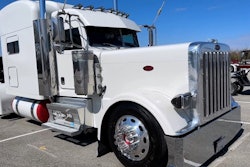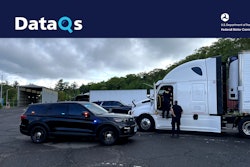The FMCSA rulemaking proposes tougher documentation requirements, as well as for states to recognize commercial learner’s permits issued by other states.
Commercial driver’s license and commercial learner’s permit applicants would be required to provide more documentation of their legal presence in the United States under a notice of proposed rulemaking published by the Federal Motor Carrier Safety Administration.
The agency also would require that CDL applicants first obtain a CLP and would mandate additional background checks of CDL applicants by state issuers. To tighten the rules on legal presence, state driver’s license agencies would be required to verify the applicant’s Social Security number with the Social Security Administration.
Many of the proposal’s elements respond to provisions of recent federal highway and security legislation and are covered by the Department of Homeland Security’s final rule implementing the REAL ID Act. FMCSA said it has coordinated its efforts with DHS to avoid overlapping or conflicting requirements, but further harmonizing may be required before the rule is final.
One problem for employers has been the failure of some states to recognize driver training in another state. The notice would require states to recognize CLPs issued by other states for training purposes. It also would limit the initial and renewal periods for both CLPs and CDLs and clarify under what circumstances an applicant must surrender those licenses or permits.

Successful completion of the knowledge test would be required before a CLP is issued, and the proposal incorporates by reference the latest American Association of Motor Vehicle Administrators’ Model Test package for knowledge and skill standards. To reduce the potential for fraud, FMCSA proposes to ban the use of foreign-language interpreters in the administration of the knowledge and skills tests.
Comments on the proposal are due June 9. For a copy of the notice, visit www.regulations.gov and search Docket No. FMCSA-2007-27659.
– Avery Vise
FMCSA Advisers Want Apnea Testing
The Medical Review Board of the Federal Motor Carrier Safety Administration has recommended that CDL holders with a body mass index of 30 or higher be referred for sleep apnea testing. An agency spokesman emphasized it is only a recommendation.
The FMCSA has the choice of acting on such recommendations in whole, in part or not at all, and there is no timetable for such responses, said Duane DeBruyne, FMCSA deputy director. Moreover, anything the agency pursues would have to go through a formal process of publication and public comment, DeBruyne said.
The board voted 4-1 for the recommendation at its Jan. 28 meeting, minutes of which were not approved until April 7.
Sleep apnea is a serious disorder that interrupts a person’s breathing during sleep. People with untreated sleep apnea stop breathing repeatedly while sleeping. Besides sleeplessness and fatigue, sleep apnea can cause excessive snoring, acid reflux and other health problems, and it can aggravate any existing heart or lung trouble.
Certain physical features, such as excessive weight, are common to people with sleep apnea, although people who aren’t obese can suffer it as well. A BMI of 30 or greater – 220 pounds for a 6-foot-tall person – puts people at risk for developing obesity-related medical conditions such as sleep apnea. Nearly a third of Americans are obese.
At the Jan. 28 meeting, board member Dr. Barbara Phillips called the BMI cutoff point a “contentious issue for the board and its Sleep Apnea Medical Expert Panel.”
Another board member, Dr. Matthew Rizzo, said he objected to the recommendation because of the clear relationship between sleep apnea and BMI, noting that BMI alone may be a risk factor for crashes.
Proper treatment will lead to significant health-care savings for fleets, but the cost of tests and treatment is not inconsiderable, said Wendy Sullivan, former occupational health manager for Schneider National. Schneider requires mandatory testing and compliance monitoring for sleep apnea, and more than 1,900 of its drivers have been treated for it.
– Jill Dunn
U.S. Senate Bill Would Equalize Diesel, Gas Taxes
U.S. Sen. Olympia Snowe, R-Maine, has introduced the Diesel Tax Parity Act, which would lower the federal diesel tax to the same price as the gas tax through Dec. 31.
Introduced April 21, S.2896 was referred to the Senate Finance Committee, of which Snowe is a member. The bill temporarily would lower the diesel tax from 24.3 cents a gallon to 18.3 cents a gallon.
The price of diesel fuel has increased far more in recent weeks than the price of gasoline, Snowe said.
“The dramatic rise in fuel costs” has resulted in lobstermen and truckers going out of business, she said, “thereby endangering Maine’s most prosperous industries. One way to immediately alleviate this burden is to lower the diesel tax to make it proportional and equal to the gas tax.”
Snowe suggested the act would encourage the purchase of diesel-powered automobiles. She cited a recent New York Times story in which Vaclav Smil, a University of Manitoba energy expert, estimated diesel engines are at least 25 percent more efficient than gas engines. In Europe, roughly 45 percent of new cars are diesel-powered, Snowe said.
Critics of the fuel-tax holiday proposed by Republican presidential candidate John McCain and echoed by Democratic presidential candidate Hillary Clinton have noted that any federal fuel-tax cut, of any duration, would cut funding to the already cash-strapped federal Highway Trust Fund and presumably would have to be made up somehow.
Clinton’s rival for the Democratic nomination, Barack Obama, D-Ill., has said he is against the suspension because it would be a short-term move that would save consumers little. Both Democrats support a windfall-profits tax on oil companies.
An unrelated proposal in the New York Senate would eliminate state fuel taxes for the summer, bringing the average price of a gallon of New York diesel from $4.58 to $3.93.
Bill S7594-A, sponsored by Sens. Andrew Lanza, Charles Fuschillo and Joe Robach, all Republicans, would eliminate state fuel taxes from May 27 through Sept. 2. The bill would allow local governments the option of waiving local sales taxes of 14 cents per gallon.
“The bill will be structured in a way that provides a guarantee of sufficient State resources to fully fund the State’s Dedicated Highway and Bridge Trust Fund,” said an announcement from New York’s Senate Republican majority, that didn’t explain how.
The speaker of New York’s majority Democrat lower house, the state Assembly, announced his opposition to any such tax holiday. “Eliminating the gas tax in New York State for the summer months will result in a $500 million shortfall in revenues that are dedicated to road and bridge construction across the state – and we already have a deficit in funding for these vital projects,” said Rep. Sheldon Silver, a Democrat. “In a year when New York State is already facing significant economic challenges, it is the height of fiscal irresponsibility to create this enormous hole in the state budget.”
– Jill Dunn
Surcharge Pass-Through Legistration Makes Its Way Through Congress
U.S. Rep. Tom Petri, R-Wis., has introduced the House version of a Senate bill that would require the entire fuel surcharge to be passed to the fuel buyer.
Petri introduced the Trust in Reliable Understanding of Consumer Costs (TRUCC) Act on April 30. The bill, H.R. 5934, was referred to the House Committee on Transportation and Infrastructure.
When introducing the bill, Petri said independent truckers and the owners of small trucking companies have told him they don’t always receive the full fuel surcharge from brokers or carriers.
“In normal circumstances, this seems patently unfair, but in this day of $4-plus-per-gallon diesel fuel, it is unconscionable that a fuel surcharge is being assessed but not passed on to the one actually paying the fuel bill,” Petri said. “I have been told by one of my constituents who is an independent trucker who will be appearing in bankruptcy court next month that this inequity contributed to his financial problems. It is not right, and it should be corrected.”
U.S. Sens. Olympia Snowe, R-Maine, and Sherrod Brown, D-Ohio, introduced mirror legislation in the Senate April 25. Both bills would amend Section 14102 of Title 49 of the U.S. Code, which deals with the responsibilities of freight carriers and intermediaries such as brokers.
– Jill Dunn
Navistar to Offer APUs, Fuel-Conscious Specs
To help new-truck buyers maximize fuel efficiency, Navistar International will offer Maxxpower auxiliary power units and five Maxximum MPG spec packages as options, the company announced May 7.
The company also announced that its ProStar tractor has 7 percent greater fuel efficiency than its closest competitor, according to independent SAE over-the-road testing.
Available this fall, the diesel-powered Maxxpower APU will have an estimated base cost of $8,500, though the California-compliant version will cost $300 to $400 more because of an add-on diesel particulate filter. The APU is a “comprehensive solution,” said Steve Gilligan, truck group assistant general manager.
The Maxximum MPG spec packages, tailored to Maxxforce, Caterpillar and Cummins engine configurations, are designed to maximize fuel efficiency in five areas: gearing, transmission, low-rolling-resistance tires, synthetic lubricants and rear-axle gear ratios.
Any new truck purchase that includes one of the packages will be discounted $1,000.
Navistar International’s goal is to provide the most fuel-efficient options possible, said Tom Baughman, truck group vice president and general manager.
– Todd Dills
Marty Stuart, Nitty Gritty Dirt Band to Perform at GATS
Two big-name acts are set to give free concerts at the 2008 Great American Trucking Show in Dallas.
Marty Stuart and His Fabulous Superlatives will headline the Friday-night concert, sponsored by Mobil Delvac. The concert begins at 6:30 p.m. Friday, Aug. 22, in Ballroom C of the Dallas Convention Center. Free ticket distribution to GATS attendees begins at 9 a.m. the day of the concert.
A four-time Grammy Award winner, Stuart is well known in Nashville as a producer, songwriter, session musician and solo artist, as well as a photographer, collector and host of Marty Stuart’s American Odyssey on XM Satellite Radio. His hits include “Hillbilly Rock,” “This One’s Gonna Hurt You,” “High on a Mountain Top” and “The Whiskey Ain’t Workin’,” a duet with Travis Tritt.
A Mississippi native, Stuart made his Grand Ole Opry debut in 1972 as a 13-year-old mandolin prodigy in Lester Flatt’s band, the Nashville Grass. Stuart became an Opry member in his own right 20 years later and is married to another Opry star, Connie Smith.
Stuart has amassed perhaps the world’s greatest privately owned collection of country-music instruments and memorabilia, 20,000 items including Hank Williams’ original handwritten copy of “Your Cheatin’ Heart,” the last boots Patsy Cline ever wore, and the first all-black stage outfit worn by Johnny Cash. He served six years as president of the board of the Country Music Hall of Fame in Nashville, to which he and Smith donated a number of items in February 2008, including Lester Flatt’s 1950 Martin D-28 guitar, the dobro Roy Nichols played on Merle Haggard’s original recording of “Mama Tried,” and the suitcase and overcoat Hank Williams was traveling with the night he died.
His website is www.martystuart.net.
The Nitty Gritty Dirt Band will headline the Saturday-night concert, sponsored by Volvo Trucks North America.
The concert begins at 6:30 p.m. Saturday, Aug. 23, in Ballroom C of the Dallas Convention Center. Free ticket distribution to GATS attendees begins at 9 a.m. the day of the concert.
The Nitty Gritty Dirt Band’s many hits include “Mr. Bojangles,” “American Dream,” “Make a Little Magic,” “Dance Little Jean,” “Fishin’ in the Dark” and “Stand a Little Rain.” The band’s classic 1971 album Will the Circle Be Unbroken united the young “hippies” with their musical heroes, including Mother Maybelle Carter, Roy Acuff, Earl Scruggs, Jimmy Martin, Merle Travis and Doc Watson.
The band performed “Hand Me Down That Can O’ Beans” in the 1969 movie Paint Your Wagon, toured Russia as the first U.S. band so invited by the Soviet Union, backed up comedian Steve Martin on his million-selling 1978 novelty record “King Tut” (credited only as the “Toot Uncommons”), dropped the “Nitty Gritty” from its name for five years before putting it back, and was memorably referred to by a tongue-tied President George H.W. Bush, during a speech in Nashville, as “the Nitty Ditty Nitty Gritty Great Bird.”
After many personnel changes through the years, today the Nitty Gritty Dirt Band performs as a foursome: Jeff Hanna, Jimmie Fadden and John McEuen, all of whom joined the group in 1966, plus Bob Carpenter, who has been with the band “only” since 1977.
The band’s website is www.nittygritty.com.
– Andy Duncan
FedEx Hybrids Surpass 2 million Miles
FedEx Corp. announced that its existing hybrid-electric truck fleet has reached more than 2 million miles of revenue service. The Memphis, Tenn.-based company says it also is expanding its commitment to clean-vehicle technology by placing an additional 75 hybrid vehicles into service in the United States and Europe.
FedEx says it now will operate more than 170 hybrid vehicles around the globe, including the largest fleet of commercial hybrid trucks in North America, which comprise nearly one-third of the deployed North American hybrid market. The company – which works with manufacturers Eaton Corp., Isuzu and Iveco – also will purchase 20 vehicles that use an Azure Dynamics hybrid system and Ford gasoline engine and chassis.
“We now need the collective leadership of business, nonprofits and government to make cleaner delivery vehicle technology widely available,” says Mitch Jackson, director of environmental affairs and sustainability for FedEx Corp. “It’s time for the truck manufacturing industry to create its version of the Prius – clean, affordable and widely available for truck fleets.”
Federal Lab Says Biodiesel Quality Improving
A recent sampling of biodiesel showed that overall quality has improved, but significant lapses still exist, reported the U.S. Department of Energy’s National Renewable Energy Laboratory.
Nearly 90 percent of samples met federal standards, the lab reported. Small-to-medium producers had significant failure rates, while larger producers fared well, the Golden, Colo., lab reported.
To be a legal fuel and qualify for tax credits, biodiesel must meet American Society of Testing and Materials International D6751 specifications. To test compliance, the laboratory collected samples of B100, or 100 percent biodiesel, directly from U.S. producers between April and November 2007.
Of 107 producers then in the market, 56 participated, representing 70 percent of the U.S. market in 2007, the lab reported. Most often, the remaining producers were unresponsive to multiple attempts to collect a sample, the lab reported.
– Jill Dunn










